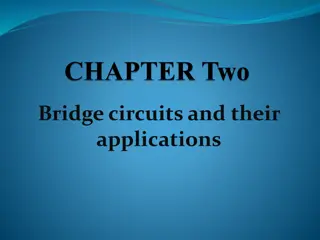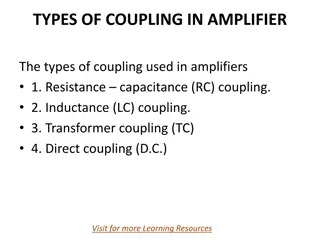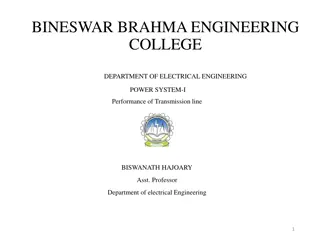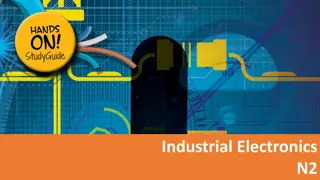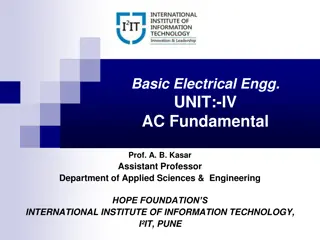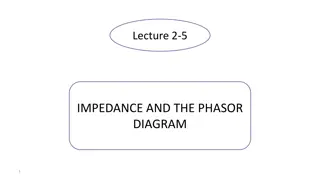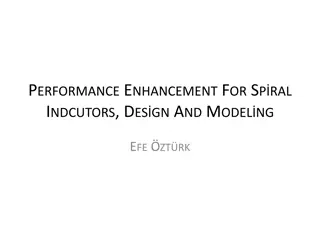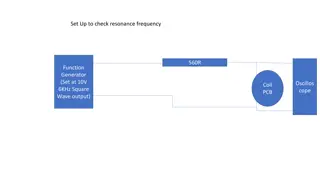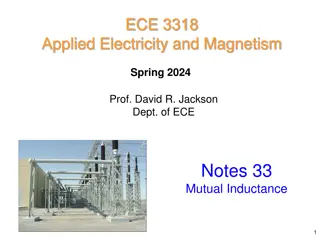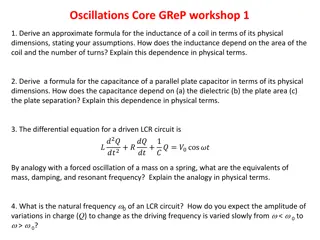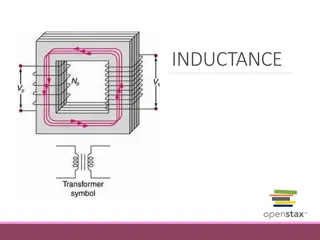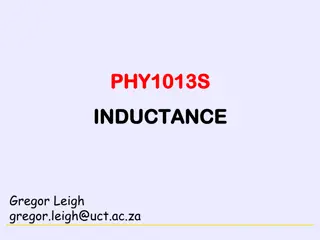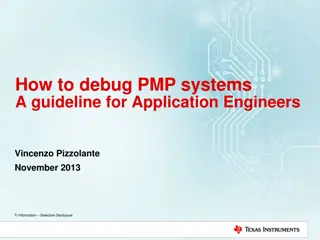Bridge circuits and their applications
Bridge circuits are commonly used for precision measurement of component values such as resistance, inductance, and capacitance. The Wheatstone bridge, a type of bridge circuit, is particularly useful for measuring small changes in resistance, making it ideal for sensor applications. By comparing un
1 views • 16 slides
Amplifier Coupling Techniques and Applications
Amplifiers utilize various coupling techniques such as resistance-capacitance (RC), inductance (LC), transformer, and direct coupling to connect different stages. Each coupling method has its advantages and applications, such as impedance matching, power transfer, and amplification of radio frequenc
2 views • 16 slides
Understanding Performance of Transmission Lines in Electrical Engineering
The performance of a transmission line in power systems is critical for efficient operation. Factors such as voltage drop, line losses, and transmission efficiency are key considerations in design and operation. The line parameters of resistance, inductance, capacitance, and shunt conductance play c
2 views • 26 slides
Understanding Electrical Principles in Industrial Electronics
Explore the fundamentals of industrial electronics, starting with direct current principles related to atomic theory, conductors, insulators, and resistors in series and parallel. Then, delve into alternating current principles, including generating an alternating voltage, alternating current (AC) b
0 views • 46 slides
Understanding AC Fundamentals in Basic Electrical Engineering
Exploring key concepts in AC fundamentals, including definitions of alternating quantities, important terms like amplitude, time period, instantaneous value, frequency, and angular frequency. The presentation covers AC circuits with resistance, inductance, and capacitance, providing insights into RM
0 views • 25 slides
Revolutionizing DC Circuits with Phaseback DC Choke: A Unique Electromagnetic Filter
Phaseback DC Choke, a patented product by Applied Energy LLC, offers complete voltage smoothing and AC harmonic filtering for DC circuits of all sizes. Unlike traditional chokes, it utilizes mutual counter-electromagnetic inductance for superior AC noise reduction without heating the core. This inno
0 views • 12 slides
Understanding Inductance in Electrical Circuits
Inductance in electrical circuits is a crucial concept defined by Faraday's law. It measures the opposition to changes in current, with inductors storing energy in their magnetic field. Mutual inductance and LC circuits further showcase the interconnectedness of inductance in electronic systems.
2 views • 8 slides
Understanding Impedance and Phasor Diagrams in AC Circuits
Resistive elements in AC circuits exhibit zero phase shift between current and voltage due to their angles. Inductors introduce inductance when connected to AC sources, generating magnetic flux that affects conductor charges. Faraday and Lenz's laws explain induced voltage and current direction base
0 views • 18 slides
Enhancing Spiral Inductors: Design, Modeling, and Performance Optimization
Understanding the importance of inductor parameters like inductance value, self-resonance frequency, and quality factor, this content explores loss mechanisms in inductors and ways to improve their quality. It delves into topics such as reducing phase noise in oscillators, minimizing insertion loss
0 views • 17 slides
Analysis of Resonance Frequency and Performance of 560R Coils
Utilizing a setup with a 560R coil, a function generator, and an oscilloscope, the resonance frequency was examined at 6KHz. Peak voltage variances were observed between OK and NOK coils, with resonance frequencies appearing consistent. Further analysis revealed significant differences in peak-to-pe
0 views • 7 slides
Understanding Mutual Inductance in Electric Circuits
Exploring the concept of mutual inductance between coils, this content delves into the relationship between current flow, magnetic fields, and the generation of induced voltages. It explains the calculations, properties, and circuit laws associated with mutual inductance in a clear and informative m
0 views • 15 slides
Understanding Inductance and Capacitance in Electric Circuits
Explore the derivation of inductance and capacitance formulas in terms of physical dimensions and learn about the dependencies on coil area, number of turns, dielectric, plate area, and plate separation. Understand how inductance relates to magnetic flux and coils while capacitance is linked to char
0 views • 16 slides
Understanding Coilguns: A Comprehensive Overview of Coilgun Design and Operation
Coilguns, also known as Gauss guns, accelerate pieces of iron or steel using electromagnetic coils, creating a powerful magnetic field. This overview covers the principles behind coilguns, including magnetic materials, solenoid physics, energy storage in capacitors, and the role of inductors in damp
0 views • 26 slides
Understanding Inductance and Mutual Inductance in Circuits
Inductance refers to the ability of a component to store energy in a magnetic field when current flows through it. Mutual inductance describes the phenomenon where changing current in one coil induces a current in a neighboring coil. This interaction is crucial in transformers and high-voltage gener
0 views • 4 slides
Understanding Magnetism and Inductance in Physics
Explore the concepts of magnetism, inductance, and inductors in physics, including circuit diagram symbols, energy storage, calculations in RL circuits, and determining inductance. Learn about the differences between inductors and capacitors, as well as the properties and applications of solenoids.
1 views • 14 slides
Debugging PMP Systems: A Guideline for Application Engineers
Comprehensive guideline by Vincenzo Pizzolante on debugging PMP systems for application engineers, covering topics like analysis, technical aspects, layout guidelines, trace inductance, case studies, and dealing with noise generators. Includes real-life examples and actionable solutions for managing
0 views • 33 slides
Learning-Based Prediction of Package Power Delivery Network Quality
This study presents a learning-based approach for predicting Package Power Delivery Network (PDN) quality, addressing challenges in manual design cycles and tool discrepancies. Motivation, challenges, related works, and proposed methodology are discussed, highlighting the prediction of post-layout i
0 views • 25 slides
Understanding the Effects of Air Gap Tolerance on Inductance Tolerance
This technical note delves into the impact of air gap tolerance on inductance tolerance in transformer manufacturing. It explains how controlling the core's air gap dimension is crucial for maintaining desired inductance levels within manufacturing constraints. The text discusses the small scale of
1 views • 10 slides
